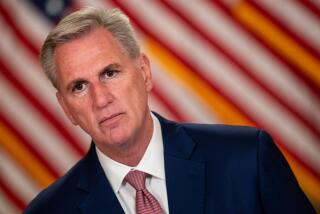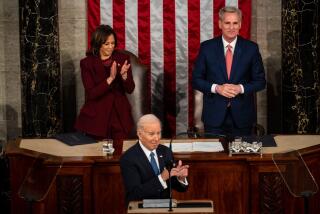‘Vital Center’ Key to Clinton Scenario
- Share via
Having fit the last pieces into his Cabinet puzzle just a few hours earlier, Bill Clinton leaned back in a bright yellow Oval Office chair and contentedly surveyed his construction.
Compared to his first team, the new Cabinet and senior White House staff “may be” a bit less liberal, he allowed. The new team, he pointed out in an extended interview Friday afternoon, is also slightly younger than the first, and lacking the kind of old friends such as Robert B. Reich and Thomas “Mack” McLarty who Clinton carried with him to Washington in 1993, like keepsakes from home.
Missing too this time are such gray eminences as Warren Christopher, Clinton’s first secretary of State, or Lloyd Bentsen, his first Treasury secretary, men who seemed as much mentors as subordinates to the young president in the administration’s first days.
“It’s a little different now,” Clinton said softly, as darkness settled outside. “I’m more elder to them in a certain way. But that’s all right.”
That subtle shift in perspective measures Clinton’s own evolution over four tumultuous years. At points in his first term, Clinton still seemed the dutiful student, turning not only to “wise men” like Bentsen and Christopher but calamitously apprenticing himself to the dubious tutelage of the Democratic leadership of Congress. Now, as he contemplates the opening of his second term--the first return engagement for a Democrat since Franklin D. Roosevelt in 1936--Clinton appears visibly more comfortable sitting at the head of the table.
From that vantage point, he seems at once impatient and confident. Impatient in that he understands the window of opportunity for progress is narrow, especially for a president looking to break the historic pattern of desultory if not disastrous second terms. Confident that after all the turmoil of his first term, he may now finally be able to construct the centrist coalition--the “vital center” drawn from both parties--that could uncork fresh thinking on old problems.
“What I want to do is create a dynamic center,” he said. “We are going to have to create a center-out coalition.”
That, of course, is also what Clinton said four years ago. Instead, his first two years produced an atmosphere of virtually unprecedented partisan polarization. Partly, the conflict flowed from the decision of the Republican leadership of Congress to scorch the earth against his budget plan. But Clinton widened the divide by linking his fate so tightly with congressional Democratic leaders (who consistently argued against bipartisan cooperation, especially in the House) and designing budget and health care proposals difficult for Republicans to embrace.
After the Republicans seized control of Congress in 1994, Clinton declared his independence, sometimes siding with congressional Democrats against the GOP, other times infuriating them by reaching accommodations with Republicans on issues like welfare. That nuanced new balance--combined with Republican overreaching--keyed his revival.
Is he willing to accept defection from the Democratic left as the price of reaching more agreements with a center-right Republican majority in 1997? Clinton responds that more Democrats will “embrace change” than many think. But when asked specifically if he will support a budget only if it attracts a minimum percentage of Democratic support, he answers crisply: “No.”
If he could script the progression of events for 1997, Clinton says, it would unfold this way: Make a deal to extend the life of the Medicare trust fund for a decade or so. Then reach an overall agreement to balance the federal budget, while funding his investments in education and other social priorities. Finally, appoint a bipartisan commission to restructure Social Security and Medicare for the crushing burden of retiring the baby boomers.
If it were up to him, Clinton says, he would “start negotiations immediately” with congressional Republicans over the budget. Clinton understands that’s not going to happen--Republicans want him to present his own budget first, if only to vent their anger over his attacks on their 1995 budget plan by denouncing his blueprint. Clinton sounds as if he won’t take that too personally.
“I’ll take a few licks on it from their perspective,” he said. “Let’s do that for a couple of weeks. Then let’s go to work here.”
Aides say that as he completes his budget proposal, the president is looking for ways to signal to Republicans that he’s serious about reaching agreement and not just replicating the battles of the last two years.
In conversation, Clinton previews what could be a dramatic gesture, saying he is committed to reaching out to Republicans on Medicare, the issue that most explosively divided them over the last two years. By the end of last year’s budget talks, he notes, the once cavernous gap between the two sides on how much to reduce the growth of Medicare spending had narrowed to a manageable difference, with Clinton proposing to slow the program’s growth by $124 billion over the next six years and the Republicans proposing $168 billion.
*
“They say, ‘We want you to go first on Medicare; you beat us up on Medicare last time,’ ” Clinton said. “I want to show good faith on that. I am going to reach out to them.”
Does reaching out mean he will propose larger Medicare reductions in his new budget, due to Congress on Feb. 3? “I will make a gesture where they will know I am serious about reaching an agreement,” he said firmly.
And if the two sides can reach agreement to balance the budget--”my instinct is yes,” it can be done, he insists--Clinton says he would like to quickly follow with a commission that would reform Social Security and Medicare for the retirement of the baby boomers. Such a commission, he says, should not only include Democrats and Republicans, but represent other contending interests: baby boomers and the succeeding generations who will have to pay for their benefits.
“The real beauty of a commission is that we know basically what the alternatives are; there may not be any clear right answer, so what you need is to build the best and most responsible consensus that reflects all of these interests,” he said.
In this potential garden of bipartisan goodwill, the largest snake remains the ethical allegations coiling around the administration. Amid the multiplying questions about Asian American fund-raising, Clinton expresses exasperation at the Democratic National Committee for failing to institute the same procedures for assessing the propriety of contributions that he says his reelection campaign and legal defense fund have instituted.
“The thing I am angriest about was that the checking systems we put into place for the legal defense fund and our campaign were not in place at the Democratic Party,” he said.
Yet the DNC was hardly a rogue agency last year: Its leadership worked intimately with senior White House staff throughout the election. And Clinton further muddies the line of responsibility by abjuring direct criticism of John Huang, the fund-raiser at the center of the DNC controversy, or Yah Lin “Charlie” Trie, the old Arkansas acquaintance who turned up with envelopes full of questionable contributions for his legal defense fund.
*
“The reason I have not been more critical of Charlie Trie or John Huang is that it is not clear to me . . . to what extent they knew exactly what they were doing and whether it was wrong,” Clinton said. “One thing we know is that the culture out of which they come doesn’t draw the same bright lines between politics, government and business that we do.”
All of that mushy relativism drops from Clinton’s voice when he’s asked about his own long-term impact on the Democratic Party. In 1992, Clinton steered Democrats away from indulgent positions on crime and welfare that had hobbled the party since the 1960s. Now, he envisions his presidency producing a more fundamental “watershed” in the party’s mission.
“I think it will be seen as when the Democratic Party made a fundamental shift away from the idea that the purpose of each succeeding generation of Democrats was to protect everything that had been done before and expand upon it in the same way, kind of marginally adding to the creation of the welfare state,” he said. Instead, Clinton hopes to leave the party a “fundamentally different view of government”--as a less centralized, less bureaucratic “solver of problems” that offers fewer guarantees but provides people with tools--from job-training vouchers and education tax credits to the television V-chip and broader access to credit--to improve their own lives.
That’s an intriguing, if unfinished, vision--one that accepts public skepticism about big government yet rejects the Republican argument that government can help only by getting out of the way. With its cuts in existing programs, entitlement trims and squeeze on new spending, this new synthesis concedes more to conservative priorities than most liberals can stomach. But it extends the most consistent line in his thinking: the effort to design a form of activist government that can command majority support.
Amid the constant threat of ideological crosswinds and ethical mudslides, the president seems eager to prove he can fill in that design more effectively than he did at the outset of his first term. Like Frank Capra’s George Bailey, Clinton understands that in this Christmas season, he has been given the rarest of gifts: a second chance to get it right.
More to Read
Get the L.A. Times Politics newsletter
Deeply reported insights into legislation, politics and policy from Sacramento, Washington and beyond. In your inbox twice per week.
You may occasionally receive promotional content from the Los Angeles Times.










